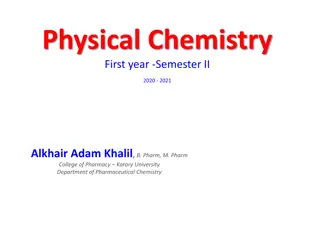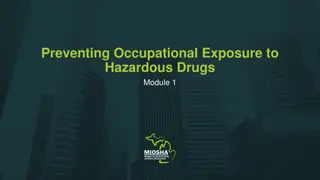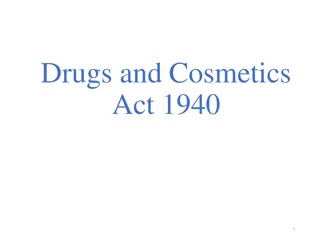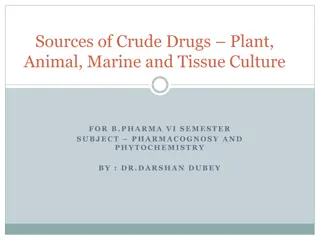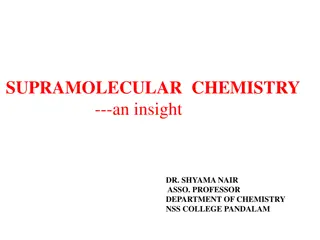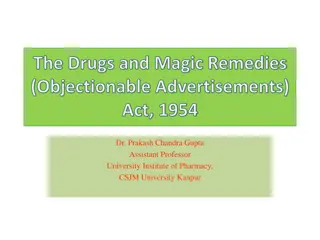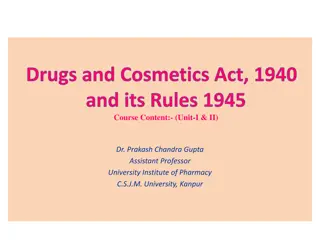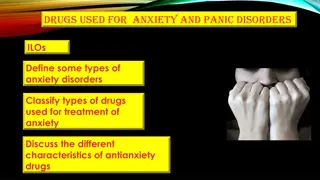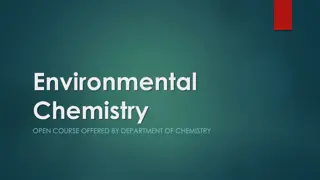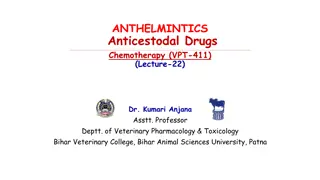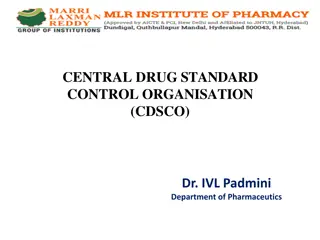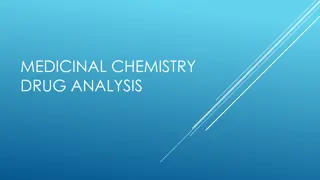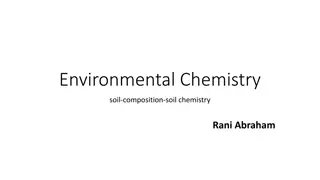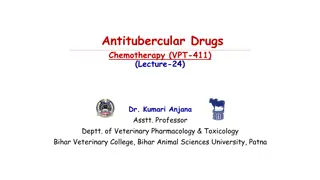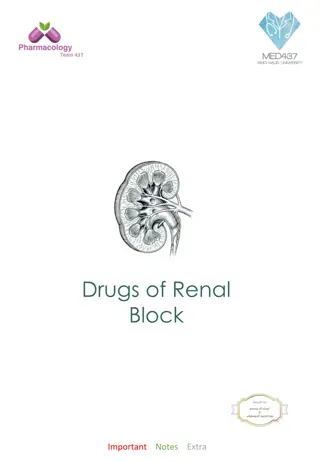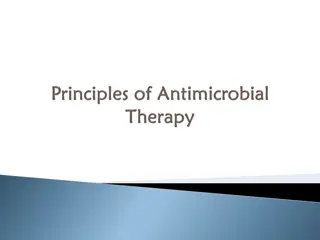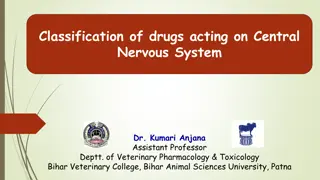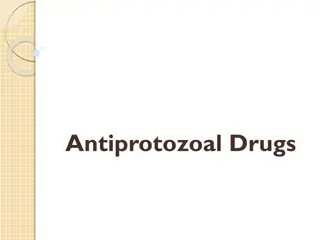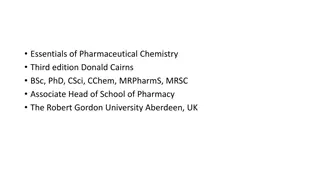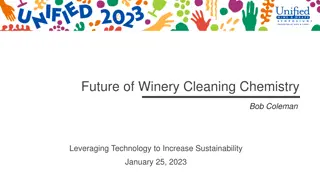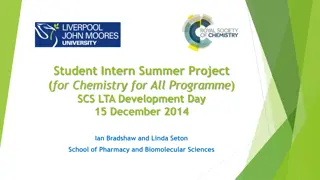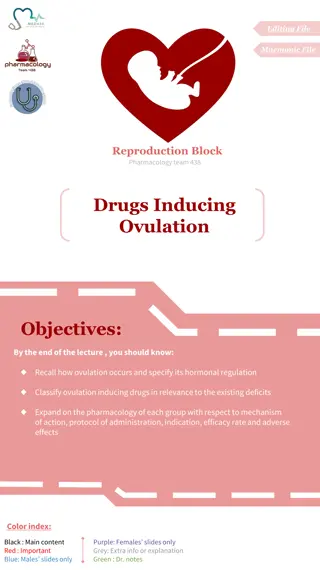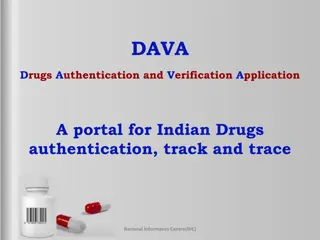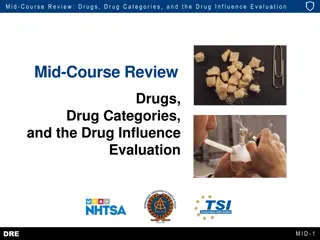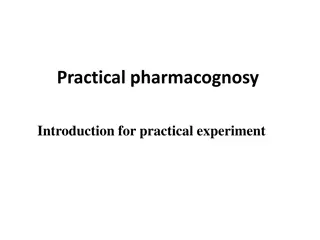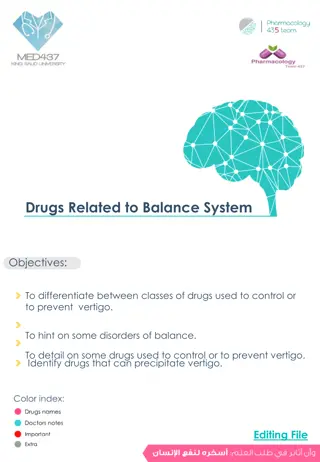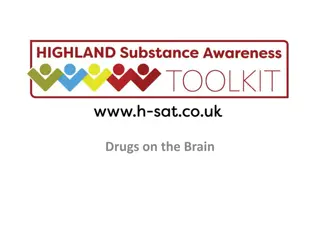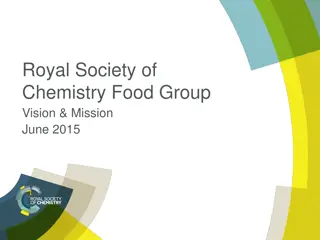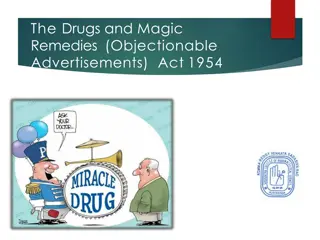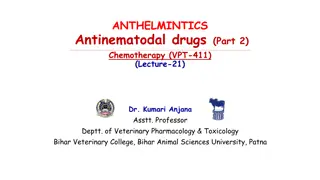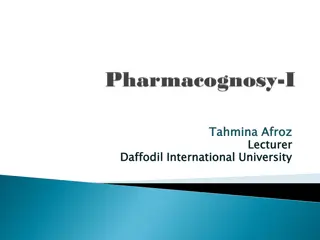Introduction to Co-ordination Chemistry: Fundamentals and Applications
Explore the fascinating field of coordination chemistry, delving into the complexity of compounds and the coordination bonds that govern their structures. Discover the history, key concepts, and applications of coordination chemistry through a detailed examination of coordination compounds, bonding
13 views • 73 slides
Fuel Your Success Conquer the IB Chemistry (SL and HL) Examination
Ignite your potential and achieve excellence in the IB Chemistry (SL and HL) Examination with our comprehensive study resources. Access practice exams, study guides, and expert guidance to excel in your test. Start your journey towards academic success today!\nClick Here to Get IB-Chemistry Dumps Wi
4 views • 6 slides
Role of Chemistry in Pharmaceutical Sciences
Medicines and drugs used for treating diseases are organic or inorganic chemicals. Studying drug chemistry is essential for pharmacists. This course covers fundamentals of chemistry, states of matter, radiochemistry, thermodynamics, kinetics, and chemical equilibria. Important subtopics include atom
2 views • 35 slides
Occupational Exposure to Hazardous Drugs: Risks and Prevention
Learn about the hazards of exposure to hazardous drugs, including potential health risks such as cancer, nausea, reproductive toxicity, and organ damage. Explore training modules, drug categories, and a list of hazardous drugs to ensure workplace safety. Discover NIOSH criteria for identifying hazar
1 views • 42 slides
Overview of Drugs and Cosmetics Act, 1940
The Drugs and Cosmetics Act of 1940 was enacted to regulate the import, manufacture, distribution, and sale of drugs and cosmetics in India. The Act aims to ensure high standards of medical treatment, prevent substandard drugs, and establish advisory boards for different types of drugs. It sets out
0 views • 49 slides
Sources of Crude Drugs: Plant, Animal, Marine, and Tissue Culture in Pharmacognosy
Crude drugs are natural substances obtained from plants, animals, and minerals. They are used without much processing and have therapeutic properties. Different plant parts like leaves, flowers, fruits, seeds, roots, bark, and stems yield various important drugs. Animals and minerals also serve as s
1 views • 19 slides
Exploring Supramolecular Chemistry: Insights and Applications
Supramolecular chemistry delves into the chemistry of molecular assemblies, intermolecular bonds, and non-covalent interactions, leading to the formation of supra-molecules through aggregation of molecular subunits. Concepts like molecular recognition, self-organization, and host-guest chemistry pla
0 views • 18 slides
The Drugs and Magic Remedies (Objectionable Advertisements) Act, 1954 Overview
The Drugs and Magic Remedies (Objectionable Advertisements) Act of 1954 regulates the advertising of drugs and remedies claiming magical properties in India. It defines drugs and magic remedies, prohibits certain types of advertisements related to drugs, and aims to control misleading marketing prac
0 views • 12 slides
Overview of Drugs and Cosmetics Act, 1940 and Its Rules 1945
The Drugs and Cosmetics Act of 1940 and its Rules of 1945 were established to regulate the import, manufacture, distribution, and sale of drugs and cosmetics in India. The Act ensures that only qualified individuals are involved in these processes and aims to prevent the entry of substandard or spur
0 views • 116 slides
Overview of Anxiety Disorders and Antianxiety Drugs
Anxiety disorders are conditions characterized by excessive worry and fear that can interfere with daily life. Common types include generalized anxiety disorder, panic disorder, phobias, and OCD. Treatment options include psychotherapy and anxiolytic drugs such as benzodiazepines, 5HT1A agonists, be
0 views • 25 slides
Environmental Chemistry Open Course: Understanding Pollution and Control Measures
Dive into the world of environmental chemistry with this comprehensive open course offered by the Department of Chemistry. Explore the causes, effects, and control measures of air, water, soil, noise, thermal, light, and radioactive pollutions. Gain insights into pollution terminology, water quality
2 views • 9 slides
Overview of Anticestodal Drugs in Veterinary Pharmacology
Anticestodal drugs play a crucial role in combating tapeworm infections in veterinary medicine. These drugs are classified into taeniafuges and taenicides, with examples of natural and synthetic compounds highlighted. Natural compounds like pumpkin seeds and male fern are traditionally used for thei
0 views • 29 slides
Overview of Central Drug Standard Control Organisation (CDSCO) in India
The Central Drug Standard Control Organisation (CDSCO) is the main regulatory body in India for pharmaceuticals, medical devices, and clinical trials. It functions under the Directorate General of Health Services, Ministry of Health and Family Welfare, Government of India. The CDSCO is responsible f
0 views • 18 slides
Understanding Generic Drugs and Brand Name Medications
Generic drugs are identical copies of brand-name medications in dosage, strength, quality, and intended use. They contain the same active ingredients but are sold under their chemical name. This article explores the basic differences between generic and brand-name drugs, when generic drugs are marke
0 views • 20 slides
Exploring Medicinal Chemistry and Drug Analysis
Medicinal chemistry involves the discovery and development of therapeutic chemicals for medicine, focusing on the interaction of compounds with biological systems. It explores the benefits and drawbacks of drugs, emphasizing the importance of safety and efficacy. Examples such as morphine, barbitura
0 views • 16 slides
Understanding Soil Chemistry and Redox Reactions in Environmental Chemistry
Soil chemistry plays a crucial role in sustaining healthy soils by influencing nutrient availability through oxidation and reduction processes. Redox reactions in soil are impacted by factors like oxygen content and water presence, affecting nutrient supplies. The redox status of soil reflects its n
1 views • 92 slides
Overview of Antitubercular Drugs: Introduction, Classification, and Applications
Tuberculosis is a chronic granulomatous disease caused by Mycobacterium bovis in ruminants and Mycobacterium avium in dogs and pigs. These bacteria have a unique waxy appearance due to their cell wall composition, providing a shield against pharmacological compounds. Antitubercular drugs play a cruc
3 views • 28 slides
Understanding Renal Block: Drugs, Excretion, and Treatment Essentials
Renal block plays a crucial role in drug excretion, with processes like glomerular filtration and tubular secretion affecting drug elimination. Factors like blood flow, physiochemical properties, and urine pH influence renal excretion of drugs. Competition between drugs for transporters can have ben
0 views • 10 slides
Advances in Antimicrobial Drugs: Selective Toxicity and Classification
The development of antimicrobial drugs has significantly improved therapeutics by controlling infections and preventing complications. These drugs target invading microorganisms using selective toxicity, sparing host cells. Antimicrobial drugs are classified based on site, mechanism of action, and c
0 views • 30 slides
Classification of Drugs Acting on Central Nervous System
The Central Nervous System (CNS) plays a crucial role in coordinating the body's functions and responses to the environment. Drugs acting on the CNS can be classified into CNS stimulants and CNS depressants. CNS stimulants include spinal, medullary, and cortical stimulants, with various direct and i
0 views • 10 slides
Understanding Antiprotozoal Drugs: A Brief Overview
Protozoal infections are widespread, impacting both developed and underdeveloped regions due to globalization. Antiprotozoal drugs are crucial for treating diseases like malaria, amebiasis, and more. However, these drugs can have potent toxic effects on host cells. This article delves into the class
0 views • 29 slides
Understanding Chemistry through Open-Ended Questions
The content provides a detailed assessment of student responses to open-ended chemistry questions related to hydrogen peroxide and its applications in teeth whitening gels. Various student answers are analyzed based on their understanding of the chemistry concepts involved, with explanations given f
1 views • 18 slides
Comprehensive Alignment of MOE Chemistry Syllabus with Khan Academy Resources
This comprehensive alignment showcases the correlation between the Ministry of Education (MOE) chemistry syllabus and the educational resources provided by Khan Academy. It covers various topics in chemistry such as the particulate nature of matter, atomic structure, chemical bonding, stoichiometry,
1 views • 9 slides
Understanding Pharmaceutical Chemistry: A Comprehensive Overview
Pharmaceutical chemistry delves into the study of drugs, encompassing their development, discovery, synthesis, absorption, metabolism, and more. It involves the design and synthesis of biologically active molecules to create new pharmaceuticals or enhance existing drug structures. Chemistry plays a
0 views • 5 slides
Innovations in Winery Cleaning Chemistry for Sustainability
Explore the future of winery cleaning chemistry through leveraging technology and sustainable practices. Considerations for chemistry selection focusing on safety, hazardous materials, employee well-being, and environmental impact are highlighted. Current cleaning chemistry practices, including the
0 views • 19 slides
Overview of LJMU Chemistry for All Programme Summer Internship Project
LJMU's Chemistry for All Programme aims to enhance student experiences through summer internships, curriculum development, and outreach activities. The project, funded by the Royal Society of Chemistry, involves a cross-university collaboration to engage local schools and foster interest in chemistr
0 views • 21 slides
Pharmacology of Ovulation-Inducing Drugs
Understanding the mechanism of ovulation and hormonal regulation is key in classifying drugs used to induce ovulation. This lecture covers the pharmacology of different groups of drugs, their mechanisms of action, administration protocols, indications, efficacy rates, and adverse effects. Antiestrog
0 views • 6 slides
Understanding Anticonvulsant Drugs in Pharmaceutical Chemistry
Anticonvulsant drugs play a crucial role in managing epilepsy, a common neurological disorder characterized by recurrent seizures. This article discusses the classification of epileptic seizures, mechanisms of action of anticonvulsants, and the role of GABA A receptors as targets for anticonvulsant
0 views • 27 slides
DAVA Drugs Authentication & Verification Application by National Informatics Centre
The DAVA Drugs Authentication & Verification Application, developed by the National Informatics Centre of the Government of India, enables authentication, tracking, and tracing of Indian drugs at different packaging levels. Manufacturers maintain Unique Serial Numbers for primary and secondary packa
2 views • 42 slides
Comprehensive Review of Drugs, Categories, and Drug Influence Evaluation
This mid-course review covers key aspects such as defining drugs, naming drug categories and subcategories, identifying drug categories for specific drugs, components of drug influence evaluation, and examinations conducted as part of the evaluation process. The content also includes identifying dru
0 views • 28 slides
Introduction to Practical Pharmacognosy: Study of Medicines from Natural Sources
Pharmacognosy is the study of medicines derived from natural sources, exploring drugs from plants through the lenses of botany, chemistry, and pharmacology. This includes the classification of vegetable drugs based on taxonomic, chemical, and morphological characteristics. Understanding key points f
0 views • 19 slides
Understanding the Impact of Drugs on Pregnancy Development
This lecture covers factors influencing placental transfer, harmful effects of drugs at different developmental stages, FDA classifications of drugs, and teratogenic drugs. It explains how drugs cross the placenta, including physiochemical properties and stage of development affecting transfer. The
0 views • 10 slides
Drugs Related to Balance System and Vertigo Management
Understanding the classes of drugs used to control or prevent vertigo, identifying disorders of balance, and detailing drugs used for vertigo management. Learn about drugs that can trigger vertigo and the mind map of specific treatments involving various medications.
0 views • 13 slides
Understanding Drugs and Their Effects: A Comprehensive Exploration
This session delves into the world of drugs, highlighting the characteristics and effects of substances like cannabis, heroin, LSD, ecstasy, cocaine, and NPS. Participants engage in activities matching drug descriptions with names, followed by developing presentations on the drugs. Discussions inclu
0 views • 8 slides
Royal Society of Chemistry Food Group Vision & Mission Summary
The Royal Society of Chemistry Food Group aims to lead, promote, and disseminate the understanding and importance of chemistry in food. Their vision is to enhance food and nutrition security through advancing the chemistry of food ingredients. They strive to engage with various communities to promot
0 views • 4 slides
Biochemistry and Chemistry Elective Courses Overview at SRCASW
The Shaheed Rajguru College of Applied Sciences for Women offers elective courses in Biochemistry and Chemistry. The Biochemistry course covers biomolecules like amino acids, proteins, carbohydrates, lipids, and nucleic acids, emphasizing their properties and functions. It also includes practical ex
0 views • 19 slides
Understanding the Drugs and Magic Remedies Act 1954
The Drugs and Magic Remedies Act 1954 regulates the advertisement of drugs and prohibits the promotion of remedies claiming magical qualities. It defines various terms related to drugs and advertisements, while emphasizing the need for ethical and truthful advertising to protect the public. The Act
0 views • 26 slides
Overview of Anthelmintic Drugs for Veterinary Use
This lecture delves into anthelmintic drugs used in veterinary medicine, focusing on Imidazothiazoles, Tetrahydrophyrimidines, OP Compounds, and Macrocyclic Lactones. Levamisole and Pyrantel are highlighted for their effectiveness against a range of parasites in various animal hosts, along with thei
0 views • 26 slides
Overview of Pharmacognosy and Natural Products
Pharmacognosy is the study of medicinal drugs derived from natural sources, focusing on the properties and origins of crude drugs like plants and animals. The term was coined in 1815, emphasizing knowledge of drugs' physical, chemical, and biological properties. It is associated with various branche
0 views • 18 slides
Understanding Date Rape Drugs: Rohypnol and GHB
Date rape drugs, often referred to as club drugs, are commonly used at dance clubs, concerts, raves, and parties. Rohypnol, also known as Roofies, is a depressant drug prescribed in Europe for sleep and pre-surgery relaxation. It is orally taken in various colored pills, such as olive green or white
0 views • 38 slides


